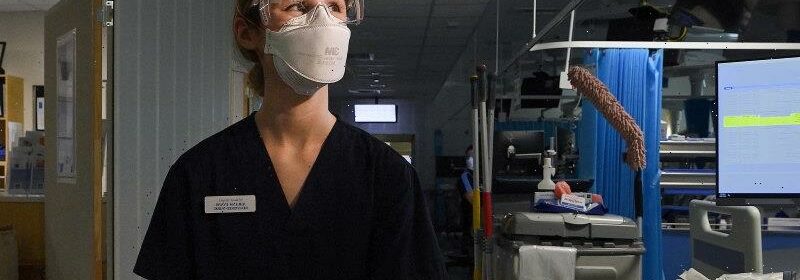Hospitals’ UK reality TV jobs drive thwarted by visa delays

Plans to recruit more nurses to Australia by advertising during a popular British reality TV show were thwarted, despite a surge in interest, when only five applicants managed to get visas.
The St Vincent’s hospital and aged care network received hundreds of international applications after linking ads to the show Nurses Down Under, which is popular in Britain, as employers across a range of Australian industries scramble to clinch global talent in a historically tight jobs market.
Welsh nurse Ariana Evans at work in St Vincent’s hospital ICU ward.Credit:Kate Geraghty
But the non-profit group’s overseas recruitment drive yielded only five nurses from the United Kingdom after Home Affairs foreshadowed wait times of several months to process visa applications.
St Vincent’s Hospital Sydney spokesman David Faktor said COVID-19 pandemic-related workforce shortages had arisen across the group’s hospital and aged-care facilities, “just as they have for all providers in our sector”.
“In the face of these challenges, we needed to be innovative in the way we attracted new talent – scarce, high demand, essential, frontline workers – and quickly,” Faktor told this masthead.
Coincidentally, in late 2020 St Vincent’s Sydney agreed to take part in British network ITV’s Nurses Down Under documentary series, produced by its Australian arm, showcasing its front-line nurses.
While the show aired from August last year, the group launched targeted social media “Healthcare Superheroes” ads that referenced the series.
Faktor said it received 1800 applications for specialist healthcare roles, including 250 from overseas applicants, yet only the five appointments were able to be made from the latter group.
He said the key impediments were “the significant time to process the relevant visas for eligible candidates”, and the lack of government funding to support the healthcare workers’ relocation to Australia.
Thousands of NSW and Victorian health workers are stuck in COVID-19 isolation, stretching hospitals’ ability to manage the latest Omicron wave, while recent government figures show the number of nursing job vacancies has doubled over the past three years.
Prime Minister Anthony Albanese last week backed a call from HammondCare chief executive and former NSW premier Mike Baird to expand the Pacific Australia Labour Mobility scheme to make it easier for aged care providers to fill vacancies.
Immigration Minister Andrew Giles said immigration had been “devalued and neglected” under the Coalition, leading to gridlock in visa processing, which the government was trying to address.
“This government is focused on first clearing the backlog, and I have been in discussions regularly with departments and officials to make sure this is a priority. The department has already reallocated staff to work on tackling this issue,” Giles said.
Catholic Health Australia, a peak body with which St Vincent’s is affiliated, has been advocating for an easing of obstacles to overseas recruitment as the nation grapples with almost 500,000 job vacancies overall. It has itself commissioned research showing more than 82,000 vacancies across health and aged care.
Caitlin O’Dea, the health policy director for Catholic Health, said plenty of qualified nurses and healthcare and aged care workers were keen to come to Australia but were being deterred by the onerous immigration system.
“When you tell people to wait nine months and jump through a hundred hoops, they quickly put Australia in the too-hard basket,” she said.
“We need to expedite the process and also assure people that when they do get a working visa they can easily convert it into permanent residency for themselves and their families … we should be rolling out the red carpet.”
Welsh nurse Ariana Evans, who is working in the intensive care unit at St Vincent’s hospital in Sydney after arriving in May, said she had long wanted to work at the hospital and had applied after seeing the advertising campaign.
“Since I’ve come here I’ve been trying to encourage a lot of my friends to come here because of the way of life,” said Evans, who is currently on a working holiday visa but hopes to stay in the country long term.
She said she worked in a supportive environment and was encouraged to upskill, however, staff shortages were also being felt.
“It can be difficult. Sometimes you feel the patient isn’t given the care they deserve because we’re short on the ground. We all work very hard to deliver the care regardless of how short we are,” she said.
Australian Nursing and Midwifery Federation national secretary Annie Butler said the union supported ethical recruitment of overseas nurses, but governments needed to deliver on a sustainable local workforce to alleviate the need for employers to go offshore for workers.
Cut through the noise of federal politics with news, views and expert analysis from Jacqueline Maley. Subscribers can sign up to our weekly Inside Politics newsletter here.
Most Viewed in Politics
From our partners
Source: Read Full Article
